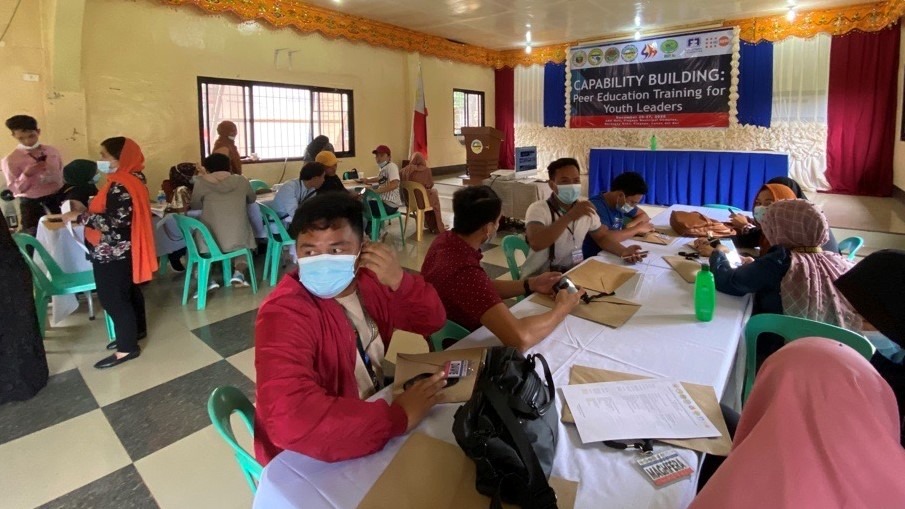Youth-led participation of religious sector in reducing teenage pregnancies
Features | by ZFF Admin

Providing access to the right information on adolescent sexual reproductive health (ASRH), family planning, and education through traditional and cultural approaches to reduce teenage pregnancies—this is the vision of Janifah Unda, 24, a youth leader in Masiu, Lanao del Sur. She takes part in the Zuellig Family Foundation’s (ZFF) Youth Leadership and Governance Program (YLGP), a partnership with the United Nations Population Fund (UNFPA) since 2018.
In 2019, an estimated seven girls aged 10 to 14 gave birth every day in the Philippines–a three-fold increase from 2000–according to the Commission on Population and Development (POPCOM). The YLGP aims to help reduce adolescent pregnancies in 10 rural municipalities of Sarangani, Sultan Kudarat, and Lanao del Sur by molding competent youth leaders who can spearhead and engage their community in youth-related health programs. Interventions include leadership and technical training, practicum, coaching, and mentoring.
Islam-compliant ASRH programs
Sharing during the mid-practicum presentation as part of the two-day YLGP virtual workshop held last February 18 and 19, Unda said that there was a common misconception that using family planning is against the teachings of Islam. Through the deep dive activities, she witnessed how poverty and lack of access to proper ASRH information and education have led to early marriages and teenage pregnancies in their municipality.
Deep dives are integral in the ZFF training, wherein leaders immerse themselves in unfamiliar environments and different contexts to gain a wider perspective of the real situation and build relationships with stakeholders. Unda talked to pregnant adolescents, witnessed their circumstances, and learned the lack of ASRH programs both at the barangay and municipal levels.
Stepping up to her role as Sangguniang Kabataan (SK) vice president in providing and engaging the youth in ASRH programs, Unda—together with the other SK leaders in Masiu—sought the engagement of Muslim Religious Leaders (Ulama Council) in the promotion of SRH to young people, particularly family planning from the Islamic perspective. The youth and their parents as well were able to debunk the notion that family planning equates to killing an unborn child in the mother’s womb, which is forbidden in the practice of Islam. They learned that family planning can be done to prevent conception. This helped them to be more open and understanding of the issues of early marriage and teenage pregnancy.
Related article: ‘Girls Not Brides’ Act Reinforces ZFF’s ASRH Initiatives
Decreased teenage pregnancies
Though limited to the records of pregnant women who visit their health centers, teenage pregnancies in Masiu dropped from 34 in 2018 (start of YLGP) to 25 in 2020. Unda’s team plan to continue the implementation of the Adolescent Pregnancy Tracking and Profiling, which they started in December 2020, to get more accurate data on teenage pregnancies.
Other accomplishments include having a functional Local Youth Development Council, and increased numbers of adolescent- and youth-led activities in SRH and adolescents reached with information and life skills on SRH.
Participating LGUs in the YLGP are guided by a technical roadmap that represents the status of their current system. With the desired impact of reducing pregnancies among adolescents and young people, an array of services should be provided, including health education, life-skills building, health promotion of available services, and provision of actual preventive services.
Related article: Establishing adolescent and youth-friendly cities seen to help curb teenage pregnancies
Continued youth engagement and LGU support
Faced with weak participation from other SK leaders and limited funding amid a pandemic, Unda and her team are still determined to achieve “a secure and diverse community that respects, empowers, nurtures, educates, and encourages a healthy and responsible youth population.” They are set to seek local government funding for ASRH programs such as the Peer Education Roll-out, which aims to create more youth leaders who can share the right information on SRH.
The YLGP is ZFF’s pilot program for engaging youth leaders. It was supposed to run for 18 months ending in December 2020, but the pandemic led to its extension until October 2021.
Know more about the ZFF health leadership training programs here: Public Health Leadership Formation.